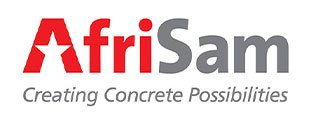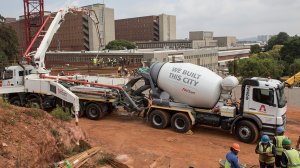Construction materials company AfriSam has welcomed the first steps in relaxing South Africa’s national Covid-19 lockdown, and looks forward to Level 3, which was earmarked to start at the beginning of this month.
The relaxed regulations now allow for critical supplies of cement and construction materials to reach specified markets.
Businesses in the cement and construction materials industry play a crucial role in the construction and maintenance of infrastructure and AfriSam sales and marketing executive Richard Tomes says the decision enables these essential service providers to have access to the critical raw materials required to perform essential service jobs during lockdown.
The demand for these materials is not as high as it would be under normal circumstances and he notes that there is still ample supply of product when an emergency situation arises.
With the lowering of lockdown levels, the new regulations enable AfriSam to resume its production to supply permitted customers. The company will continue to supply aggregate, readymix and cement products to customers in accordance with the regulations as provided by government.
Moreover, the Level 4 regulations enabled AfriSam to ramp up its aggregate and limestone mines, which fall under mining, to nearly 100% capacity, while its cement plants, depots, offices and readymix concrete operations run at a maximum capacity of 50%.
AfriSam’s Ulco and Dudfield cement plants, in particular, have ramped up in a phased approach, whereby staff return to work on rotating shifts until the plant can be 100% operational again after Level 4.
The readymix operations are operating at less than half of what is required, with less than 20% of employees having returned to site.
At office level, AfriSam has encouraged employees to continue working from home, with less than 10% of employees having returned to the company’s head office, in Roodepoort, Gauteng.
Prior to the lockdown, AfriSam bought more than 100 laptops for head office and contact-centre employees, among others, to enable them to work from home.
The investment will bode well for the company in the future in terms of re-negotiating lease agreements and reducing office space to mitigate the impact of Covid-19.
Meanwhile, AfriSam’s numbers are “significantly down”, compared with last year, but the decline “is more or less in line with the rest of the market”, he notes. This is based on overall demand data projections provided by consultancy Econometrix and Industry Insight economists.
AfriSam generated virtually no revenue for April, but still honoured fixed costs such as salaries.
The company forecasts a decline in full-year volumes for 2020 of between 20% and 25%, as a result of the national lockdown.
Economic Forecast
Referring to predictions shared by finance management consulting firm Econometrix’s Dr Azar Jammine, Tomes notes that, based on feedback from health professionals and epidemiologists, South Africa’s construction materials industry faces three potential scenarios.
For the “high-road scenario”, a V-shaped recovery is predicted: once the economy is fully reopened, demand spikes. In this scenario, volumes are expected to decline by about 18% year-on-year.
In the second scenario, a normal U-shaped recovery is predicted, where demand takes a bit longer to increase after the lockdown, and volumes are expected to decline by between 20% and 25%.
Thirdly, should the country’s lockdown stay in place for an extended period, declines are likely to reach 30% year-on-year.
Tomes bases his forecast for AfriSam on a move to Level 3 in the next few weeks, and estimates declines to be between 20% and 24% year-on-year.
Prior to the lockdown, South Africa was already facing severe challenges such as financial risks, uncertainty, low economic growth and rising debt levels.
Amid these challenges, Tomes estimates that the industry will experience hardship for between 18 and 24 months before getting back to reasonable volume and demand levels.
Few businesses are fully equipped to deal with strain for such an extended period, with businesses – such as AfriSam – looking to match operational capacity with demand, he adds.
AfriSam intends to identify opportunities for additional revenue generation while trying to continue ensuring cost management in a strategic manner.
Further, AfriSam’s senior management employees have taken a salary cut of between 25% and 30%, with CEO Rob Wessels taking a 30% reduction in salary, while its executive team have taken a reduction in salary of about 25%.
Some salary cuts have also been implemented at other levels “to share some of the pain at the moment”, says Tomes.
He believes that “the cement and construction industry will always have some sort of a fighting chance”, despite South Africa’s numerous challenges.
“Maybe the growth is not going to come at the pace that we would like to see it happen but as long as you have populations that are continuing to grow, there will always be a demand for cement in the same way that there will always be demand for basic food necessities and basic health services,” Tomes concludes.







